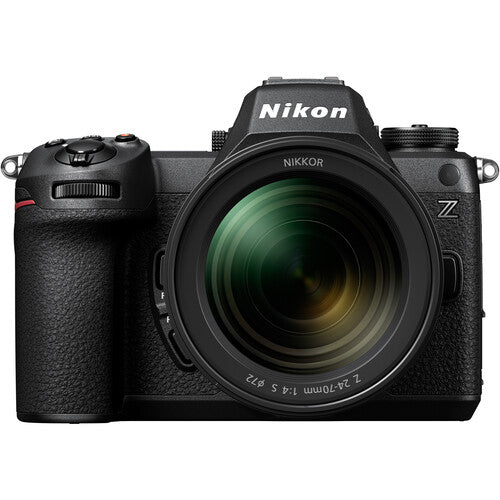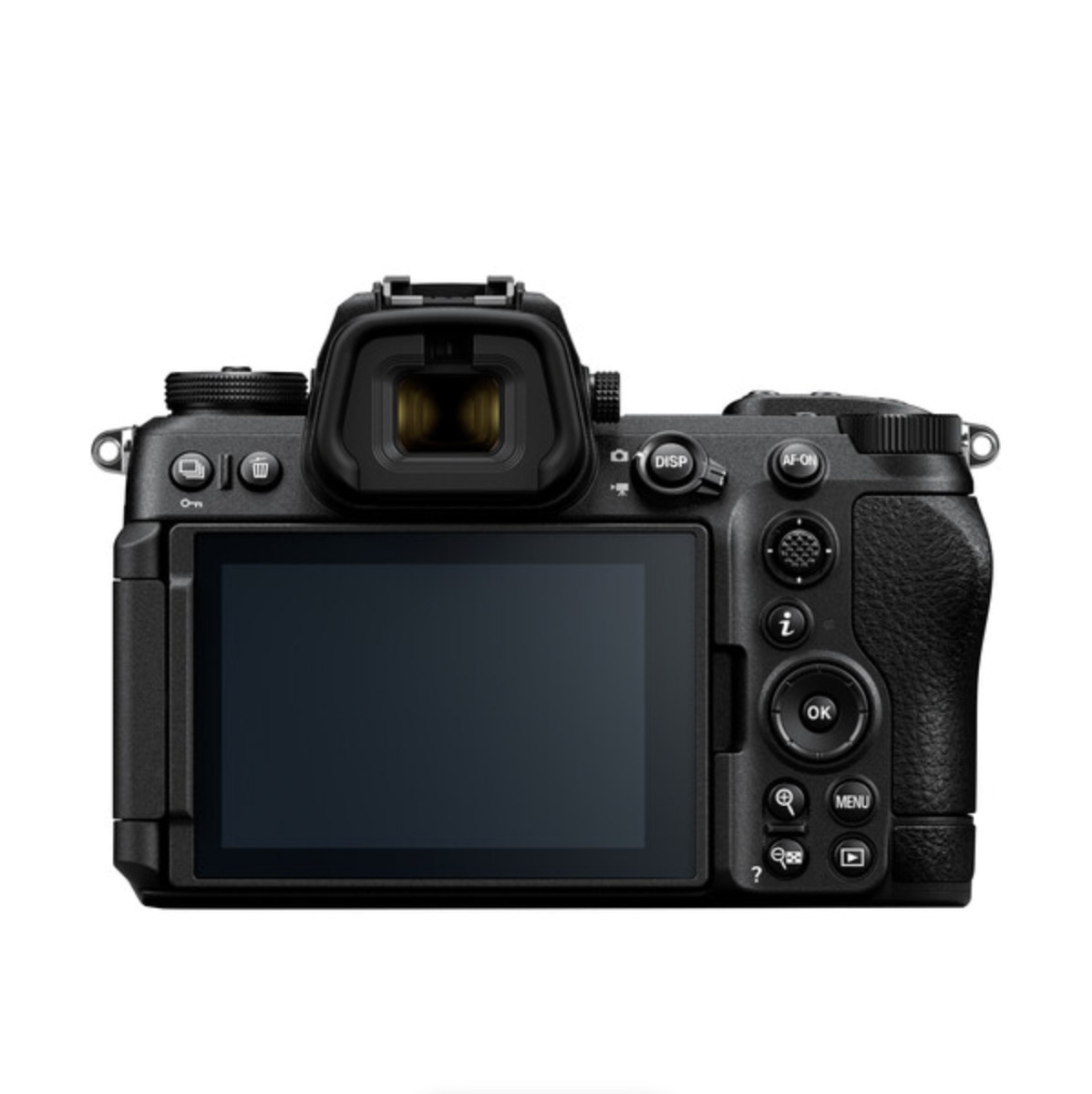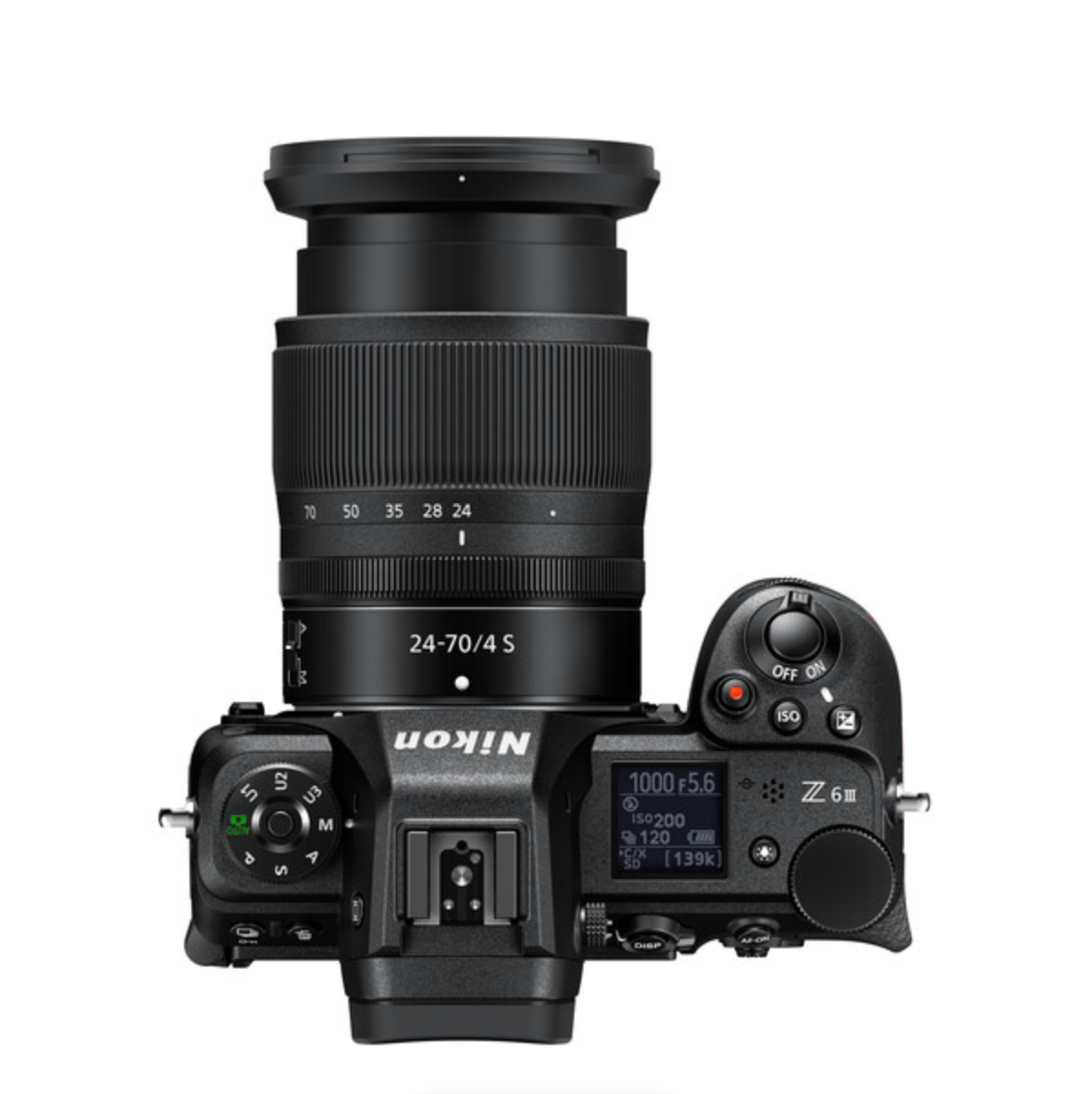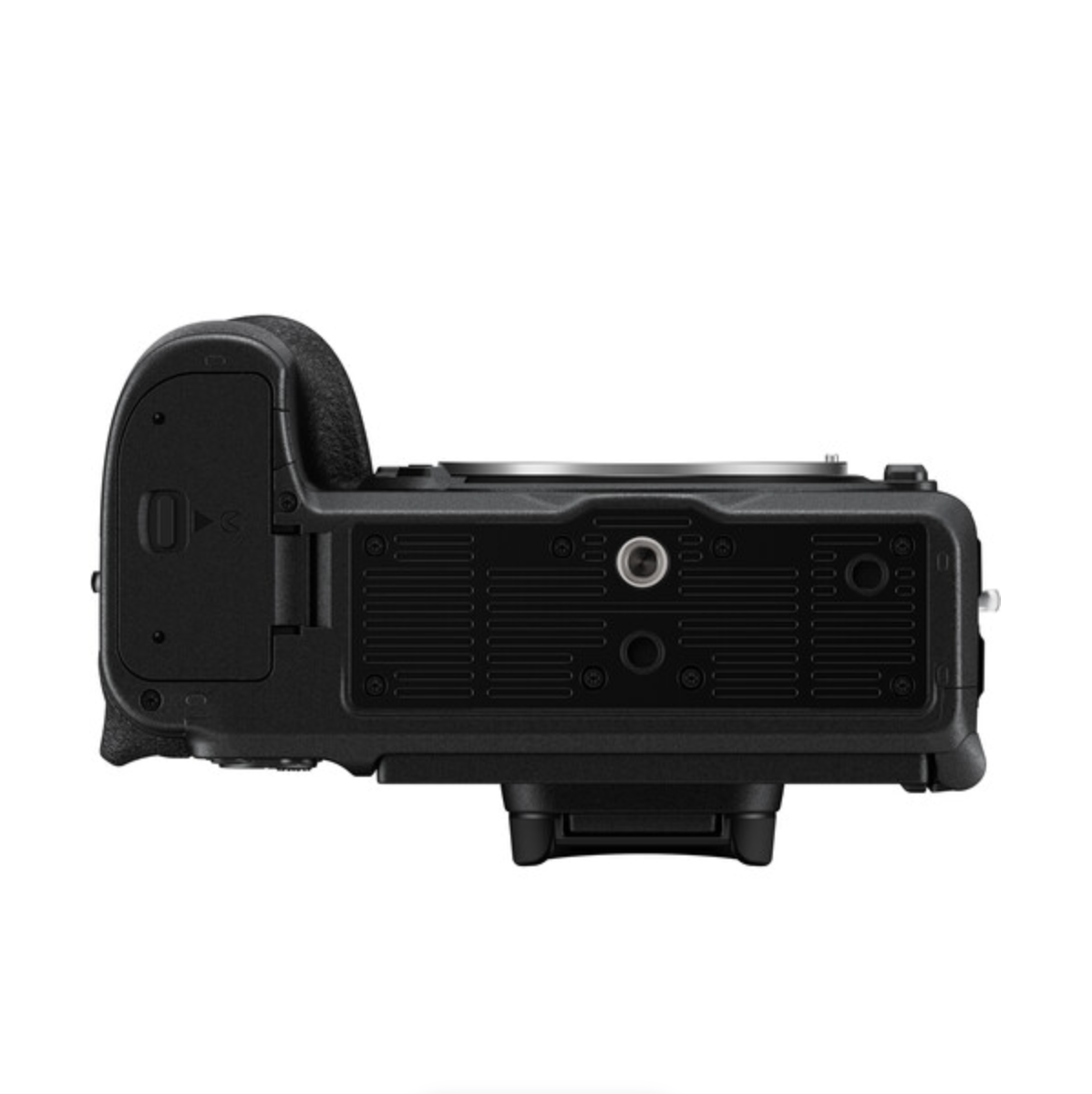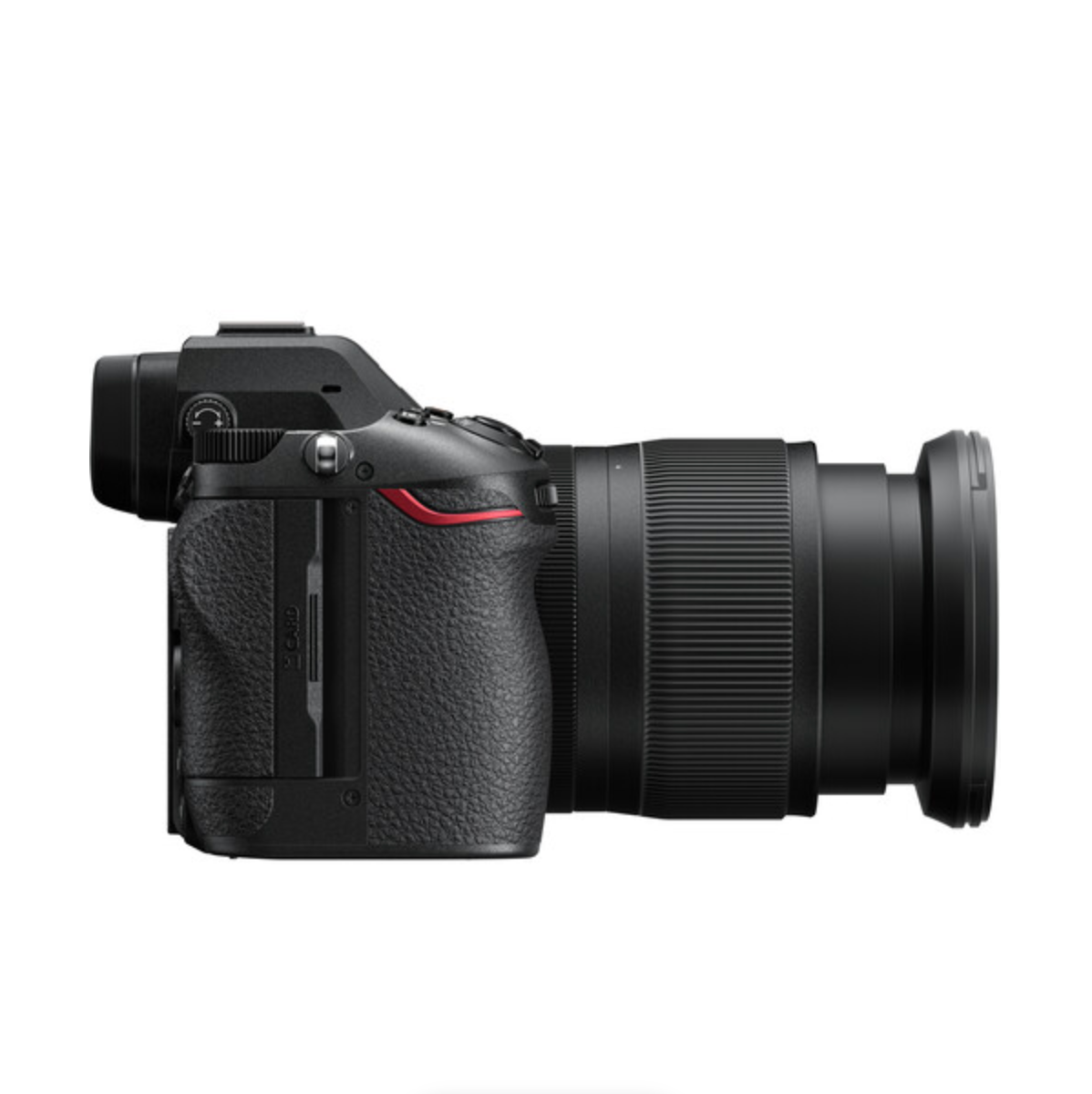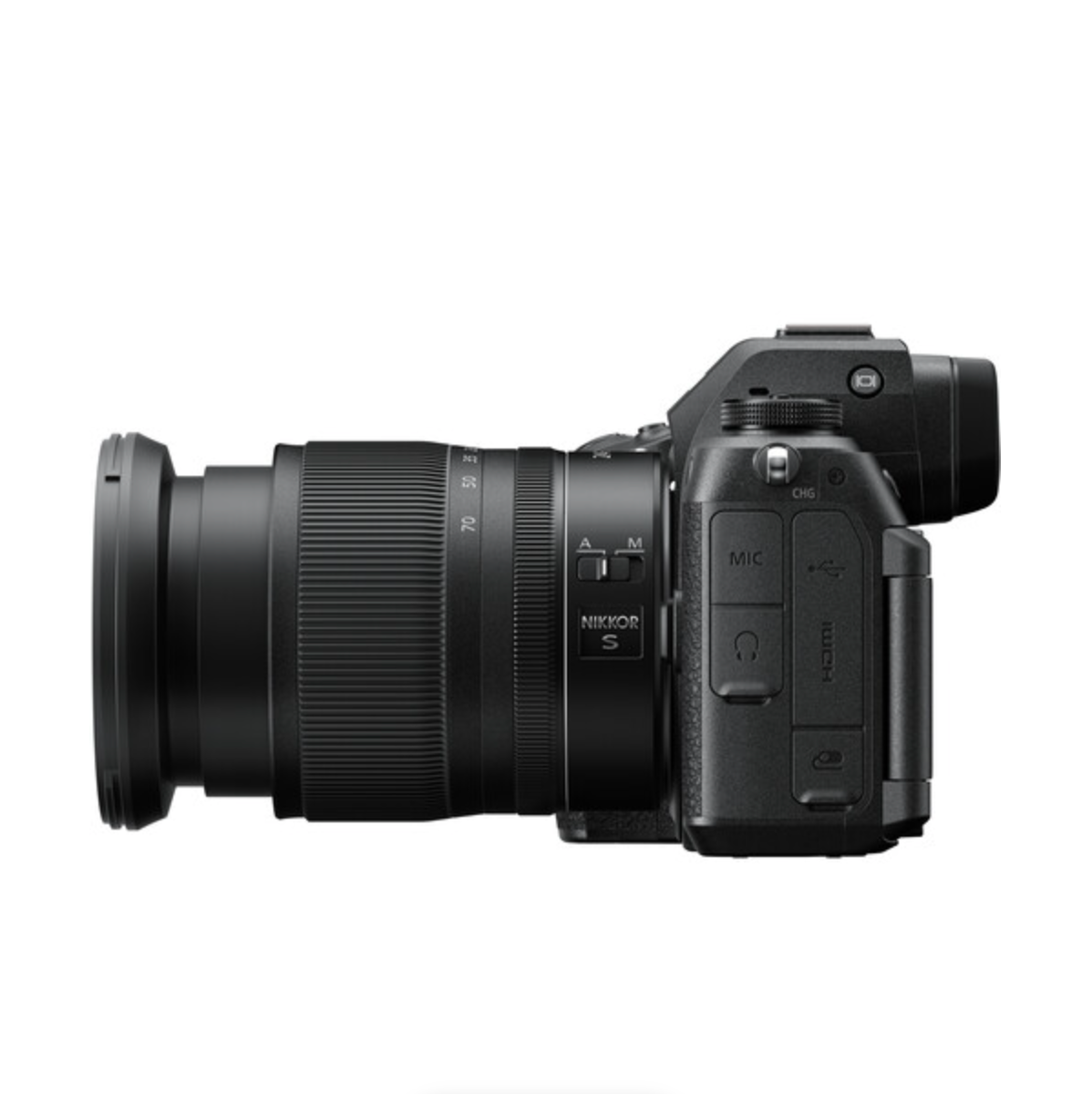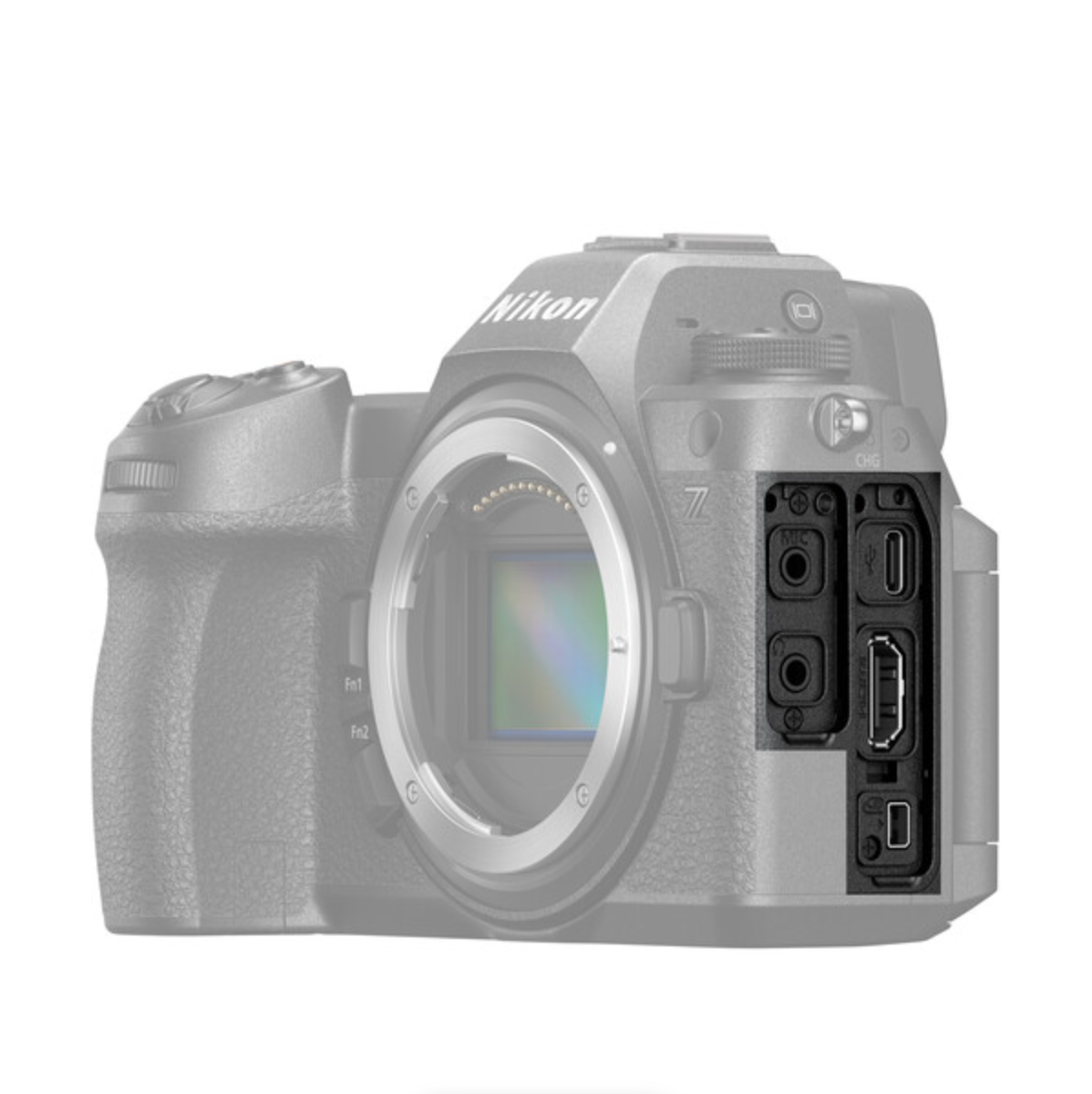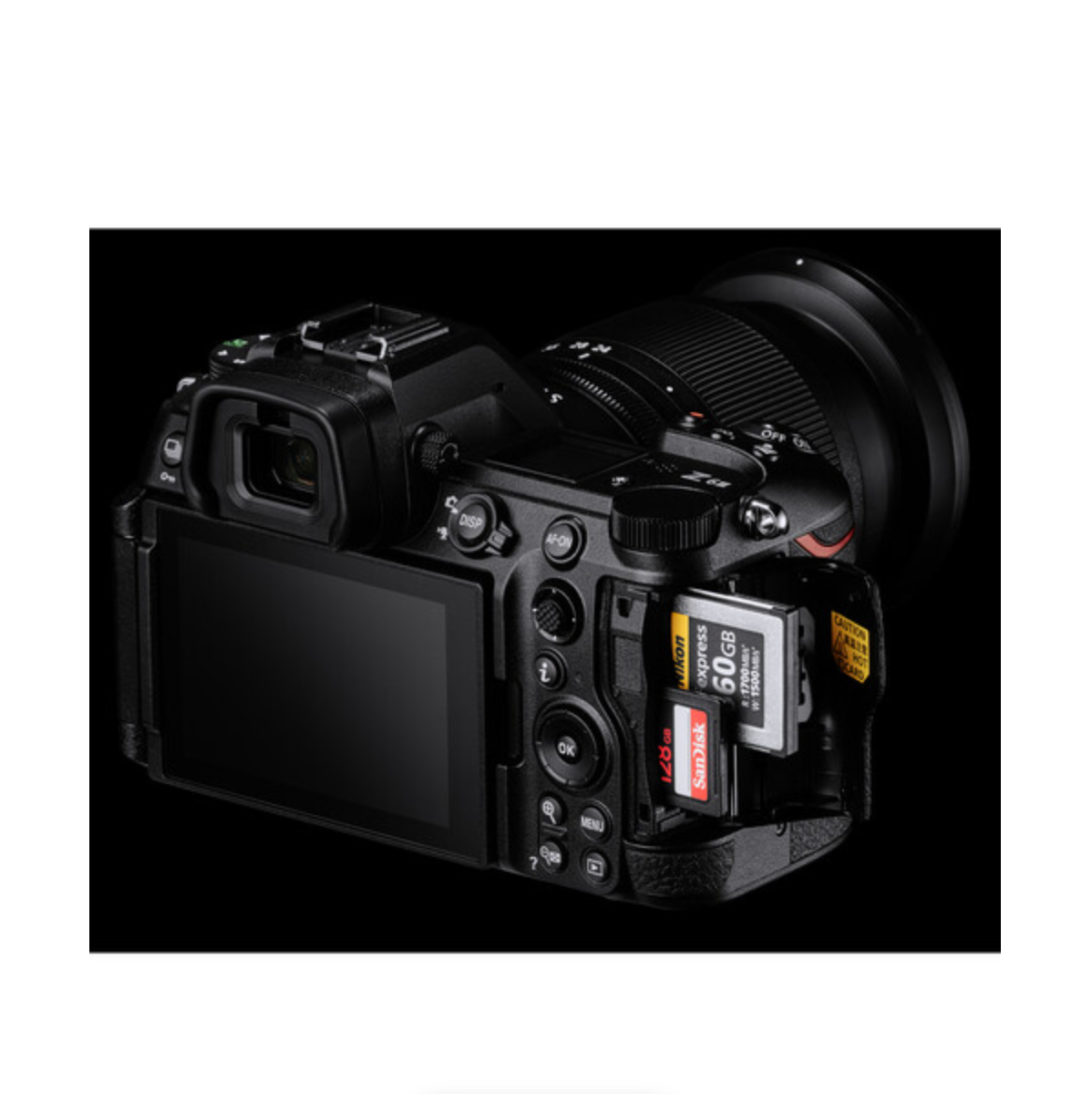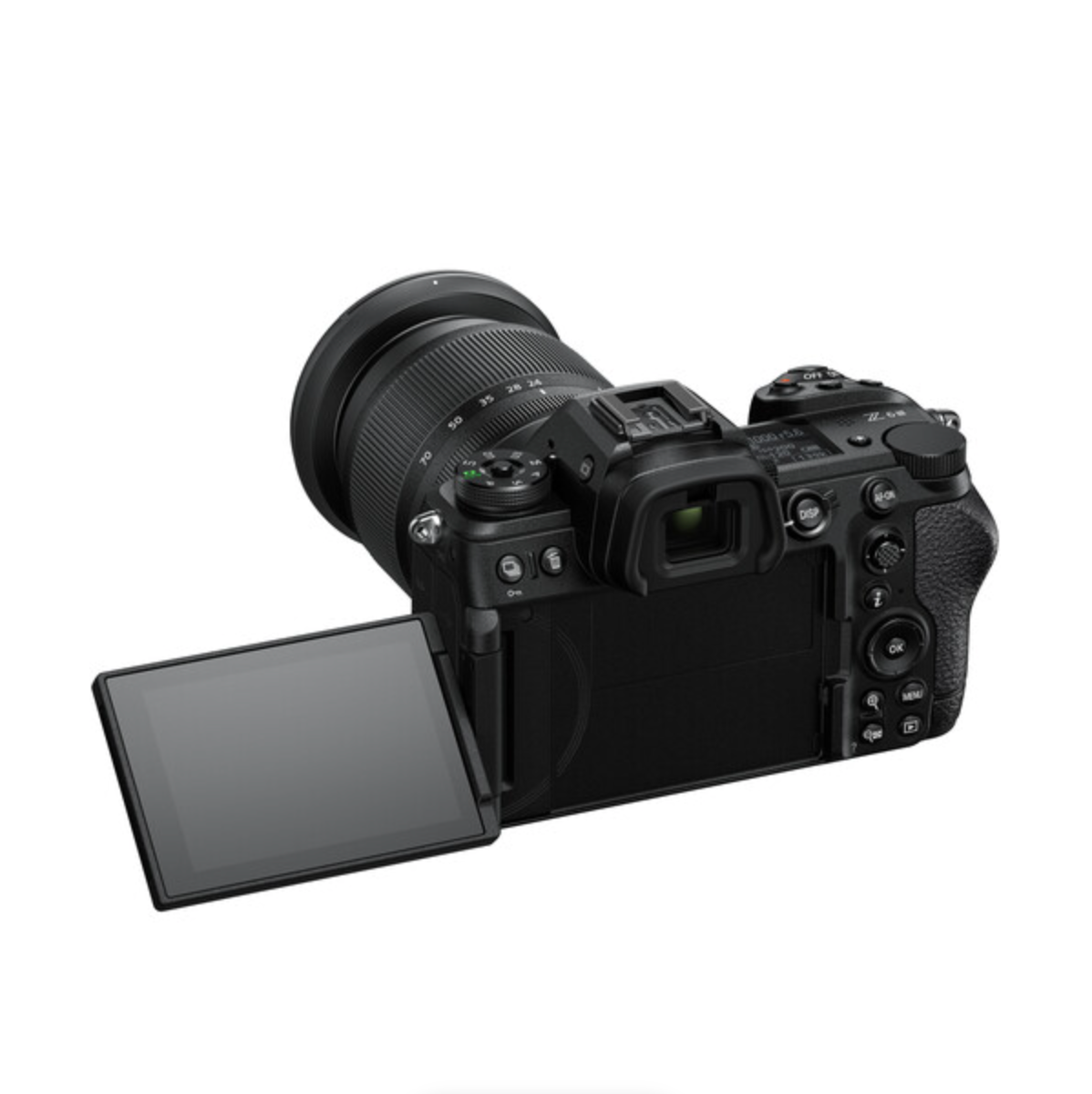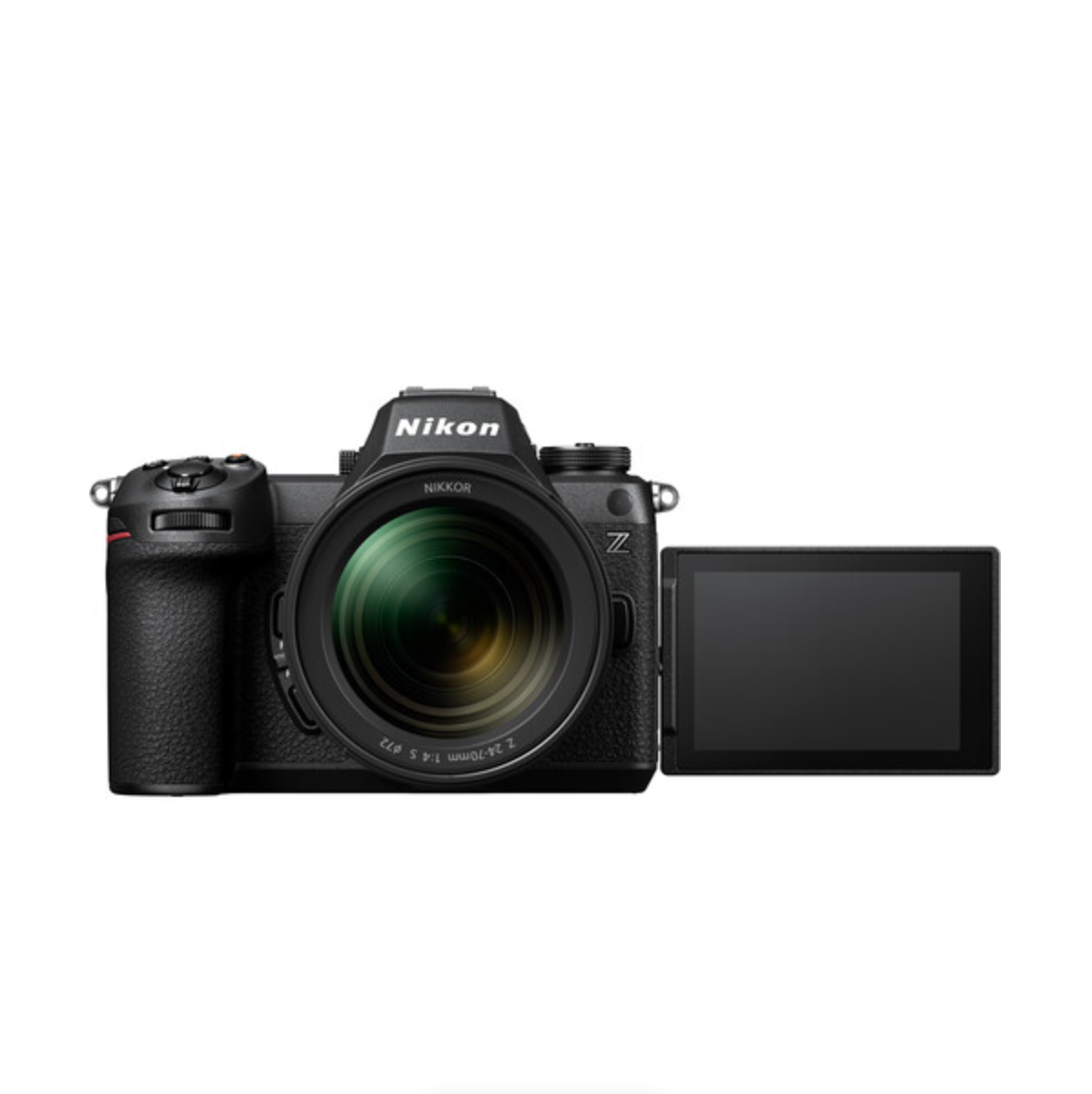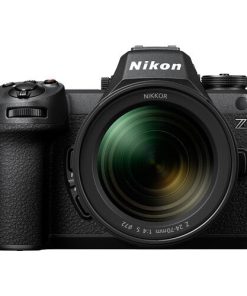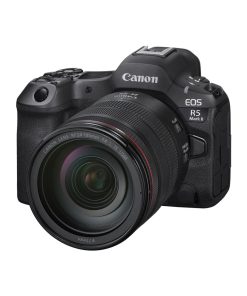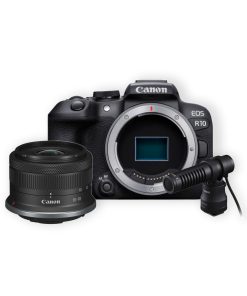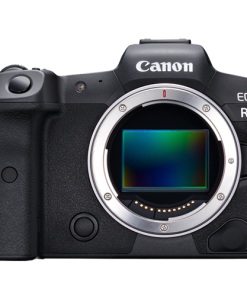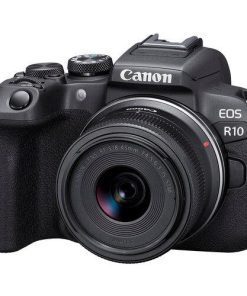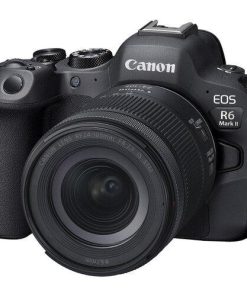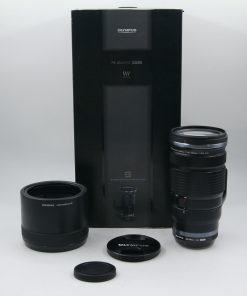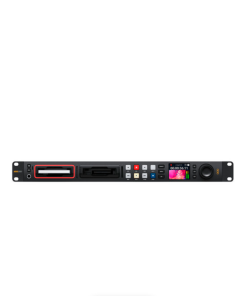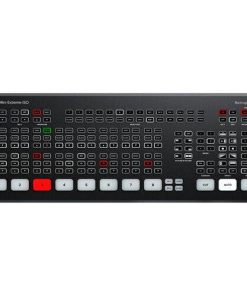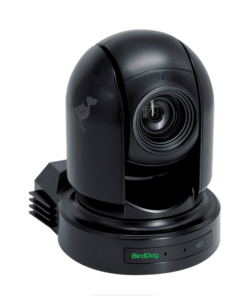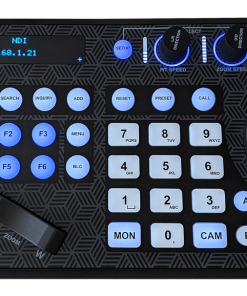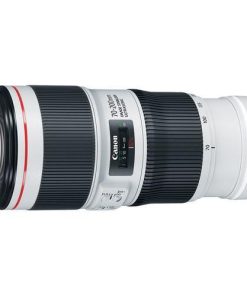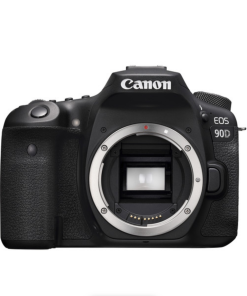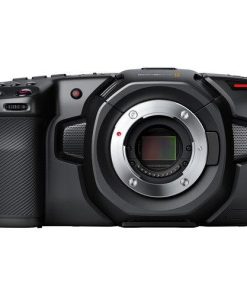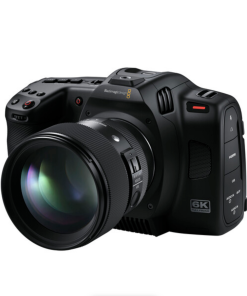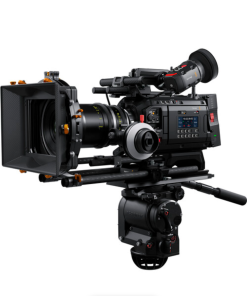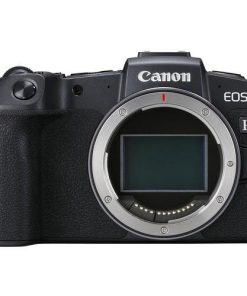Nikon Z6 III Mirrorless Camera with 24-70mm f/4 S Lens Nikon
$ 3.096,95 $ 774,24
Massive Upgrades for a Mid-Range Monster
Sporting a new and inspired partially-stacked sensor design, the Nikon Z6 III Mirrorless Camera unlocks a number of flagship-level upgrades for this mid-range camera, including faster and more precise autofocus, professional-level 6K internal raw video, pre-capture at up to 120 fps, and a smooth, bright, colorful EVF. Taken together, these upgrades make this mirrorless monster an ideal choice for aspiring professionals in search of an all-around, affordable camera.
Newly Designed Sensor and Flagship Processing
24.5MP Partially-Stacked CMOS Sensor
The Z6 III is Nikon’s first camera to to feature a partially stacked sensor design for faster scans and readouts than its predecessor. The design also reduces rolling shutter and noise levels when working at the top end of the ISO range. Additionally, this sensor design unlocks many of the flagship-level features in the camera, like faster autofocus, a smoother EVF experience, faster continuous shooting speeds, and higher frame rates when shooting video.
EXPEED 7 Image Processor
Complementing the sensor is the EXPEED 7 processing engine, found in the top-of-the-line Z8 and Z9 mirrorless cameras an which offers speeds approximately 10x faster than the Z6II. This engine works in conjunction with the partially-stacked sensor design to realize impressively fast AF speeds, burst shooting rates, a high buffer capacity, fluid video performance, and quick all-around handling.
Fast and Intelligent AF
493-Point Phase-Detection AF
Covering the full sensor area, the Z6 III’s flagship EXPEED 7 processor unlocks Nikon’s flagship 493-point phase-detection AF system to realize fast and accurate focusing performance. This system is benefitted by the high-speed communication of the Z interface along with the speed of the sensor that enables AF readings to occur at up to 120 fps.
This focusing system also supports working in low-light conditions with a Starlight mode that permits focusing down to -10 EV to greatly benefit astrophotography, concert, and other nighttime shooting applications. Featuring the highest native ISO in a Z-series camera at ISO 64000, the autofocus is also useful for working in difficult lighting conditions. The Backlit AF function uses separate pixels on the sensor that allows these areas to intentionally overexpose for focusing accuracy purposes without impacting the actual exposure of the recorded image.
A mainstay focusing mode in DSLRs, which debuted for mirrorless with the Z9, the Z6 III also includes 3D Tracking AF that pairs with subject detection to lock onto fast, erratically moving subjects that move parallel and perpendicular to the camera. Additionally, there are three Dynamic-Area AF modes, with a range of focus area sizes, for capturing a broad variety of moving subject types.
Subject Detection with Deep Learning Technology
Utilizing inherited algorithms and deep learning technology from the Z9, including sophisticated Subject Detection, the Z8 can recognize a variety of distinct subject types, ranging from humans to animals to airplanes to bicycles. When working in Auto-Area AF, these subjects will automatically be detected, focused on, and tracked to ensure sharp focus when the subject is moving across the frame.
Eye-Detection AF, specifically, has been tuned for improved accuracy and refined recognition of eyes in the scene, regardless of how small or large they are within the image frame, and can also be used in conjunction with custom Wide-Area AF for different subject shapes and sizes.
More Beautiful Portraits
Perfect for portraits, the Z6 III improves on the partially-stacked sensor’s inherent capabilities with a series of processing tools and shooting functions to improve portraits:
Pixel Shift Technology
Produce ultra-high resolution images at up to approximately 96 megapixels using pixel shift technology. By slightly shifting the image sensor between shots – selectable between 4 and 32 shots per image, with more shots meaning more detail – users can merge the images in NX Studio after shooting to create a single image with enhanced resolution, texture, and color. The shooting method also also reduces noise, moiré, and false colors. Pixel Shift photography benefits archival, landscape, architecture, fine art, macro, and film digitizing applications, and achieves its best results when working with a tripod.
Professional Level Video
Internal 6K60 and 4K 120 Recording
Equally capable for video, the Z8 matches the Z9’s recording capabilities here, as well, with a variety of resolutions and frame rates available up to 8K.
Using full pixel readout, 6K60p video can be recorded with continuous shooting, while 4K and Full HD recording is also possible in a variety of frame rates, including full-frame 4K recording at up to 120p and Full HD recording at 240p for slow-motion playback.
N-RAW and ProRes RAW Video
Internal 12-bit raw raw recording at up to 6K 60p in the N-RAW format is supported along with internal ProRES RAW HQ. Raw recording offers greater tonal and color latitude and can improve dynamic range, benefitting color grading needs and post-production flexibility.
ProRes and H.265 10-Bit Recording
Internal recording is also supported with 10-bit color and 4:2:2 sampling in the ProRes 422 HQ and H.265 codecs at 5.4K 30p and 5.4K 60p, respectively.
Nikon’s Brightest Viewfinder
The Z6 III’s sensor-processor combo has allowed Nikon to give the Z6 III the brightest electronic viewfinder on any of its cameras. At 4000 nits, it’s 33% brighter than the flagship Z9, making a subject’s details visible even in bright sunlight. Its 5,760,000 dot resolution is also a first for a Nikon EVF, aiding with autofocus by showing the subject recognition square. This EVF also works in conjunction with dual-stream technology for blackout-free viewing when shooting continuously and it features a high fps function, which ups the EVF’s refresh rate to 120 fps for smoother, lifelike viewing. Finally, the Z6 III’s EVF also features a higher dynamic range and is compatible with a DCI-P3 color gamut – the first of its kind in a mirrorless camera – for approximating real-world color when taking the shot.
Four-Axis Tilting LCD
Like the Z9 and Z8, the Z6 III incorporates a unique 3.2″ 2.1m-dot four-axis tilting touchscreen LCD that better supports working from high and low angles, regardless if shooting in the horizontal or vertical orientation. This screen’s four-way tilting design allows for easier viewing from a variety of positions and the user interface orientation will also shift depending on how the camera is held.
Body Design
Versatile Connectivity
Matching the professional build quality, the Z6 III is fitted with a variety of connectivity options to suit various workflow needs:
Nikon NIKKOR Z 24-70mm f/4 S Lens
Covering a useful range of focal lengths, the NIKKOR Z 24-70mm f/4 S is a versatile zoom, spanning wide-angle to portrait-length perspectives. Its constant f/4 maximum aperture maintains a consistent exposure throughout the zoom range and also helps to realize a more compact and lightweight alternative to an f/2.8 zoom. In regard to the optical design, a unique aspherical extra-low dispersion element, in addition to three aspherical elements, is used to help reduce chromatic aberrations and distortions throughout the zoom range in order to achieve high image sharpness and clarity. Both Nano Crystal and Super Integrated Coatings have also been applied to control flare and ghosting for greater contrast and color rendering in bright and backlit conditions.
Complementing the optics, a stepping motor provides quick, quiet, and precise autofocus performance along with full-time manual focus override to suit both stills and video applications. A programmable control ring can be set for intuitive adjustment over a variety of camera and exposure settings. Additionally, the lens has a button-less retractable barrel to realize a more compact form factor when not in use.
Quick Shipping and Professional Packaging
Due to our long-term partnership in a long-standing partnership with UPS, FedEx, DHL and many other top global carriers we are able to offer a variety of shipping options. Our warehouse staff are highly trained and will be able to pack your goods in accordance with our exact and precise specifications. Your items will go through an exhaustive examination before they will be properly packaged prior to being sent out. We ship to thousands clients each day across multiple countries. This is a sign of our dedication to being the biggest online retailer in the world. The warehouses and centers of distribution are in Europe, as well as the USA.
Orders with more than 1 item are assigned processing times for each item.
Prior to shipping, we will examine thoroughly the items you've purchased. Currently, most orders are delivered within 48 hours. The delivery time will be between 3-7 days.
Returns
Stock is dynamic, and is not completely managed by us due to the involvement of several parties including the factory and our warehouse. The actual inventory may be changed at any time. It is possible that stock may run out after your order has been processed.
The period of time is 30 days. We are unable to exchange or refund your order if it has been 30 days since you purchased it.
Your item should be in the original packaging and be unused. It must also be returned in the original packaging.
Related products
* USED DEPARTMENT - OPEN BOX - OPEN BOX LENSES - Mirrorless - Micro 4& - 3
*** NEW OPEN BOX *** Olympus M.Zuiko Digital ED 100-400mm f/5-6.3 IS Lens Olympus
* RETAIL - Cameras - Mirrorless
Canon EOS R5 Mark II Mirrorless Digital Camera with RF 24-105mm f/4L IS USM Lens Canon
* RETAIL - Cameras - Mirrorless
* RETAIL - Cameras - Mirrorless
* RETAIL - Cameras - Mirrorless
* RETAIL - Cameras - Mirrorless
* RETAIL - Cameras - Mirrorless
Canon EOS R10 Mirrorless Digital Camera with 18-45mm f/4.5-6.3 IS STM Lens Canon
* USED DEPARTMENT - B-STOCK
*** FACTORY RECONDITIONED *** Tamron AF 18-200mm F/3.5-6.3 Di II VC Lens for Canon EF Tamron
* RETAIL - Cameras - Mirrorless
Canon EOS R6 Mark II Mirrorless Camera with RF 24-105mm f/4-7.1 IS STM Lens Canon
* RETAIL - Video Production - Monitors & Recorders - Monitors
* USED DEPARTMENT - OPEN BOX - OPEN BOX LENSES - Mirrorless - Micro 43
*** OPEN BOX EXCELLENT *** Olympus M.Zuiko Digital ED 40-150mm f/2.8 PRO Lens Olympus
* RETAIL - Video Production - Studio Recorders, Hardware & Duplication
* RETAIL - Video Production - Video Mixers & Livestreaming
* RETAIL - Video Production - Monitors & Recorders - Monitors
* RETAIL - Cameras - Mirrorless
Canon EOS R5 Mirrorless Digital Camera with RF 24-105mm f/4L IS USM Lens Canon
* RETAIL - Cameras - PTZ Cameras
* RETAIL - Cameras - Cinema
Blackmagic Design PYXIS 6K Cinema Box Camera (Leica L Mount) Blackmagic Design
* RETAIL - Cameras - PTZ Cameras
* RETAIL - Lenses - DSLR - Canon EF Mount
* RETAIL - Cameras - Cinema
* RETAIL - Cameras - Cinema
Blackmagic Design Pocket Cinema Camera 6K Pro (Canon EF) Blackmagic Design
* RETAIL - Cameras - Cinema
Canon EOS R5 C Mirrorless Cinema Camera with RF 24-105mm f/4L IS USM Lens Canon
* RETAIL - Cameras - DSLR
* RETAIL - Video Production - Video Mixers & Livestreaming
Blackmagic Design ATEM Television Studio Pro 4K Live Production Switcher Blackmagic Design
* RETAIL - Cameras - Cinema
Blackmagic Design PYXIS 6K Cinema Box Camera (Canon EF Mount) Blackmagic Design
* RETAIL - Video Production - Video Mixers & Livestreaming
* RETAIL - Cameras - Cinema
* RETAIL - Cameras - Cinema
Canon EOS R5 C Mirrorless Cinema Camera Kit with RF 24-105mm f/2.8 L IS USM Z Lens Canon
* RETAIL - Cameras - Cinema
Canon EOS C300 Mark III Digital Cinema Camera Body (EF Lens Mount) Canon
* RETAIL - Cameras - Cinema
Blackmagic Design Cinema Camera 6K (Leica L Mount) Blackmagic Design
* RETAIL - Cameras - Cinema
Blackmagic Design URSA Cine 12K LF Camera with EVF Top Handle Kit (PL Mount) Blackmagic Design
* RETAIL - Cameras - Mirrorless
